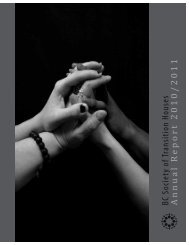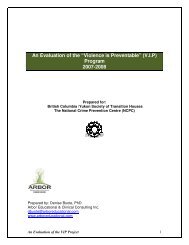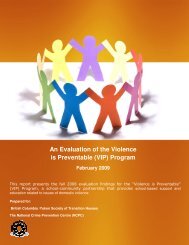reducing barriers to support - BC Society of Transition Houses
reducing barriers to support - BC Society of Transition Houses
reducing barriers to support - BC Society of Transition Houses
Create successful ePaper yourself
Turn your PDF publications into a flip-book with our unique Google optimized e-Paper software.
EXAMPLES<br />
BUILDING BRID GES, BR I TI S H COLU MB IA<br />
Headed by the Woman Abuse Response Program at the <strong>BC</strong> Women’s Hospital & Health Centre, Building<br />
Bridges: Linking Woman Abuse, Substance Use and Mental Ill Health is an initiative designed <strong>to</strong> foster<br />
relationships and dialogue within and across the mental wellness, substance use and Violence Against<br />
Women sec<strong>to</strong>rs. From 2006 until 2008, the Woman Abuse Response Program held workshops involving<br />
the three sec<strong>to</strong>rs across the province and are continuing <strong>to</strong> hold focus groups with service recipients <strong>to</strong><br />
learn about <strong>barriers</strong> <strong>to</strong> <strong>support</strong>. They expect <strong>to</strong> release a provincial framework with best practices in<br />
Spring 2010. 111<br />
AT IRA WOM EN’S RE SOU R CE S OCIETY, BRITIS H COLUMBIA<br />
Atira <strong>of</strong>fers a range <strong>of</strong> services <strong>to</strong> women who have experienced violence who have varying levels <strong>of</strong><br />
mental wellness and substance use. In 1997 Atira opened Shimai House, a <strong>Transition</strong> House for women<br />
experiencing varying levels <strong>of</strong> substance use. Women do not have <strong>to</strong> be abstinent <strong>to</strong> reside at Shimai,<br />
but cannot use substances on site. Atira has also hooked up with other service agencies <strong>to</strong> <strong>of</strong>fer Maxxine<br />
Wright Community Health Centre, for women who are pregnant or who have young children and who<br />
are experiencing violence and/or varying levels <strong>of</strong> substance use. 112<br />
CRABTR E E CORNER, VANCOU VER, BRITIS H COLUMBIA<br />
Crabtree Corner has been operating under the YWCA since 1984 and provides services <strong>to</strong> women and<br />
their families in the Down<strong>to</strong>wn Eastside <strong>of</strong> Vancouver. Women, along with their families are <strong>of</strong>fered<br />
programming that ranges from meeting basic needs (housing, hot meals) <strong>to</strong> FASD prevention and<br />
<strong>support</strong> and violence against women programming. The YWCA has built partnerships with local service<br />
providers and the three levels <strong>of</strong> government in order <strong>to</strong> sustain Crabtree Corner. Programming is based<br />
in a harm reduction framework and many <strong>of</strong> the staff share similar experiences as the women they are<br />
serving. 113<br />
HUDTA LA KE WEL LN ES S CENTR E, PR IN CE GEORGE, BRITIS H COLUMBIA<br />
Still in the development stages, Hudta will be a place for women who experience varying levels <strong>of</strong><br />
substance use based in an understanding <strong>of</strong> how “neglect, abandonment, early childhood trauma,<br />
violence and sexual abuse” can contribute <strong>to</strong> substance use.114 The programming uses First Nations<br />
methodologies. 115<br />
25






